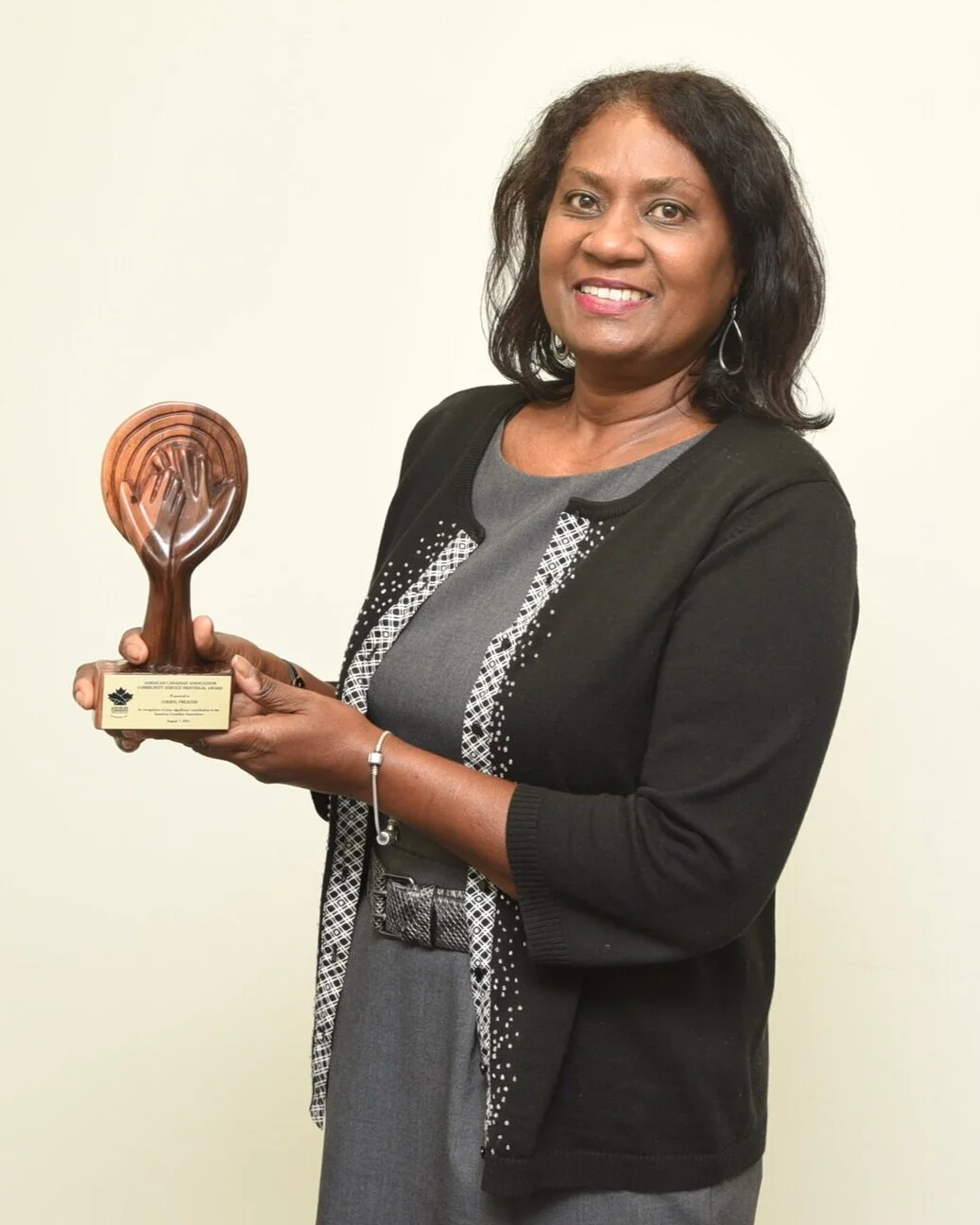Health care manager Cheryl Prescod honoured with Community Service Award
September 13, 2021
Looking forward to life in a new country and starting school, Cheryl Prescod was startled upon learning she would be placed in a grade below the one she had successfully completed in Guyana.
She migrated at age 10.
“I will never forget being told that because of where I come from, that was what I was going to have to do,” she said. “This is something that happens to students coming from Third World countries and it erodes your self-esteem. You feel less than and not as intelligent.”
Prescod was determined to defy the odds.
After finishing high school in Ottawa, she successfully pursued a Bachelor of Science at the University of Toronto (U of T) and a Master of Science at the University of Ottawa and has completed the course work for a PhD in Biochemistry at U of T.
“Doing undergraduate and undergraduate degrees built my confidence and enabled me to choose my life’s work which is with community,” Prescod, who has a Master’s in Healthcare Management from the Schulich Executive Education Centre and a Strategic Perspectives in Non-Profit Management certificate from Harvard Business School, noted. “As I got older and had children, I saw that nothing changed. When they started school, they weren’t in an environment that was conducive to success. I wanted to do something about it, so I worked with other parents who felt powerless to help their kids.”
Since 2011, she has been the Executive Director of Black Creek Community Health Centre (BCCHC) that offers quality health care and social programs to clients in the northwest corner of the city.
Cheryl Prescod has been with the BCCHC for the last 22 years (Photo by Ron Fanfair)
Starting with the organization in 1999 as a part-time Manager for a Trillium Foundation-funded Violence Prevention project, Prescod was a Community Health Worker, Program Manager, Acting Executive Director and Director of Organizational Capacity before replacing founding Executive Director Cary Milner who resigned a decade ago.
“I like the community health centre model because it combines medical problems and clinical issues with the social determinants of health,” she pointed out. “Because of my scientific background, it was easy for me to understand the medical side and the clinical pathology of things along with the social issues. It was the perfect match for me.”
As part of the North Western Toronto Ontario Health Team (OHT) unveiled in December 2019, the BCCHC, Humber River Family Health Team and Unison Health & Community Services offer primary health care.
OHTs are clinically and fiscally accountable for delivering a full and co-ordinated continuum of care to a defined attributed population.
Prescod supports this model of care that brings together health care providers to work as a team.
“It’s an interesting concept in that it really is about improving the health system to support people’s needs, regardless of whether you are in hospital for surgery or looking for a service after you have been discharged or just to prevent hospitalization,” the Northwestern Toronto OHT Co-Chair noted. “Our role is to keep community members as healthy as possible and out of hospitals.”
Funded by Ontario Health to the tune of about $12 million annually and with a core staff of 90, the BCCHC – which has sites at Sheridan Mall and Yorkgate Mall -- offers a suite of services and programs, including health promotion, harm reduction, exercise education and mental health counselling.
Other programs and services administered by the BCCHC are funded through additional streams.
Last month, the federal government announced an investment of nearly $3 million for the BCCHC and the Black Creek Community Farm in partnership with York University’s Innovation York’s YSpace, Schulich Executive Education Centre and TD-Community Engagement Centre, to support Black Canadian entrepreneurs and businesses in Humber River-Black Creek.
The funding is part of the Government of Canada’s Black Entrepreneurship Program investment of more than $400 million to support the long-term success of Black business owners and entrepreneurs in Canada.
The BCCHC has also received funding from the municipal government for violence prevention and the impact of COVID on communities.
Prescod was instrumental in setting up testing centres and vaccine pop-up clinics in northwest Toronto. Under her leadership, BCCHC was a major partner of the Black Community Vaccine Initiative that resulted in the distribution of approximately 5,000 vaccines since May 8 at six pop-up clinics at the Jamaican Canadian Association (JCA) centre.
“When testing started, it seemed that this area was overlooked yet again,” said the Canadian Mental Health Association Board member. “It occurred to me that this was another inequity we are seeing. These people are invisible and they are not thought about. As a Black woman, I saw myself as part of that group and decided to act in the wake of a deadly virus that was decimating populations.”
Working closely with Emery-Keelesdale Nurse Practitioner Clinic, Toronto Medics, Home & Community Care Central West Local Health Integration Network, Ontario Health and Toronto Public Health, mobile testing clinics were set up in July 2020.
“Because we know the barriers people face here, it was obvious to us that testing couldn’t be done only at hospitals by appointment,” she said. “A lot of people are busy at their jobs and don’t have access and the ‘know how’ to book those appointments. To see for myself what it was like, I tried and was on hold for an hour on the phone before hanging up. This is a very diverse community with people from around the world, many of whom don’t speak English.”
To increase vaccination rates among Blacks in Canada, Prescod co-authored an article with Dr. Aisha Lofters, Dr. Azza Eissa, Nancy Akor and Onye Nnorom to combat vaccine distrust. It was published in the Canadian Medical Association Journal last August.
In a recent research study, it was revealed that the COVID-19 vaccine rates for Black Canadians is significantly higher compared to the rest of the population.
“Those that are most accepting of the vaccine have been vaccinated,” she said. “The challenge now is getting through to those that are resistant and trying to educate them. We understand the resistance and mistrust. Using Black voices, we are trying to convey the message that we would not be advocating for vaccines if we didn’t believe in them. We want them to be at the front of the bus instead of being at the back when it comes to taking vaccines.”
What has been Prescod’s biggest challenge during the pandemic?
“It is the inability to see loved ones,” the mother of three children said. “I have an older sister residing alone in England who was diagnosed with cancer. Unable to travel and not be with her has been very hard. This is something that’s common in this community and there are many people who migrated from different places who have been unable to visit family members. COVID has impacted us in many different ways. It’s not just the fear of getting very sick or even dying. It’s the isolation on top of all the other social issues.”
At the annual celebration to mark Jamaica’s independence and the birth of the JCA in August 1962, Prescod was presented with a Community Service Award.
Cheryl Prescod was the recipient of the JCA Community Service Award (Photo by Ron Fanfair)
JCA President Adaoma Patterson made the nomination.
“Our awards this year focused on people and organizations who worked to mitigate the impact of COVID-19 and Cheryl’s impact has been tremendous,” she noted. “She has ensured that northwest Toronto received equitable access to COVID-19 testing and vaccines. She pushed health systems to address systemic discrimination and income disparity among Black and racialized communities and partnered with organizations, including the JCA and the Caribbean African Canadian Social Services (CAFCAN) to design vaccine clinics that meet the needs of our communities. In addition, she has contributed significantly to the SickKids study led by Dr. Upton Allen looking at COVID and antibodies in Black communities.”
Prescod’s persistent voice advocating for an equitable COVID-10 response for under-served communities also impressed former JCA Vice-President Sylvanus Thompson.
“Under her leadership, Black Creek Community Health continues to play an integral role in collaboratively addressing the inequities highlighted by the pandemic and by providing low barrier access to information, resources, testing and vaccinations for members of the community they serve,” said the recently retired Toronto Public Health Associate Director. “These efforts aim to ensure a just and equitable recovery from the pandemic for all with hopes to bridge the gaps in care for marginalized populations.”
Being recognized by an organization with a long-standing track record of community service and whose values align with her is significant for Prescod.
“One of my goals is to serve my community, the people that look like me,” she said. “These are the people that are often invisible and don’t ask for services. They don’t come out and demand what is their right. It’s my labour of love to ensure that happens.”
Last June, Prescod was recognized with a Pillar of the Pandemic Award for her sterling service during the pandemic.
Created by the U of T’s Dalla Lana School of Public Health in partnership with Closing the Gap Healthcare, Pillars of the Pandemic is a new interdisciplinary series established to honour the contributions that health and health care professionals and volunteers across Ontario have made to public health and health during the COVID-19 pandemic.
Prescod’s passion for caring and giving was fuelled by her late mother.
Marion Douglas died in May 2008 at age 87.
“Despite how little we had, our home was like a village,” said Prescod, the youngest of 10 siblings. “She fed and took care of everyone who came through our door or was in need. I didn’t know what poverty was until I came to Canada.”
On the frontline fighting the pandemic wasn’t the only exacting challenge she tackled in the last few months.
A six-week strike ended in late July with BCCHC frontline staff affiliated to the Ontario Public Service Employees Union/SEFPO Local 5117 ratifying a new collective agreement.
The union was demanding a one per cent increase over three years.
Prescod said the BCCHC didn’t have sufficient government funding for a staff increase.
“We weren’t guaranteed a permanent increase to our base budget, hence I couldn’t promise we could fulfil that,” said. “What we said is that should we receive the one per cent increase from the government, we would implement it immediately which we have done in the past. This is the first time we have had this request from the union. In the past, we didn’t negotiate salaries because it was understood by the unions that we don’t have control of our funding.”
Insisting she’s not anti-union or anti-worker, Prescod feels she was unfairly targeted during the bargaining process.
“I felt there were elements of racism and people wanting to stand up to this Black woman doing this work in the community and speaking up against anti-Black racism,” she said. “When you do that, you have got to expect some backlash. I am really disappointed in how that played out. It was unfortunate and something I have to live with.”







